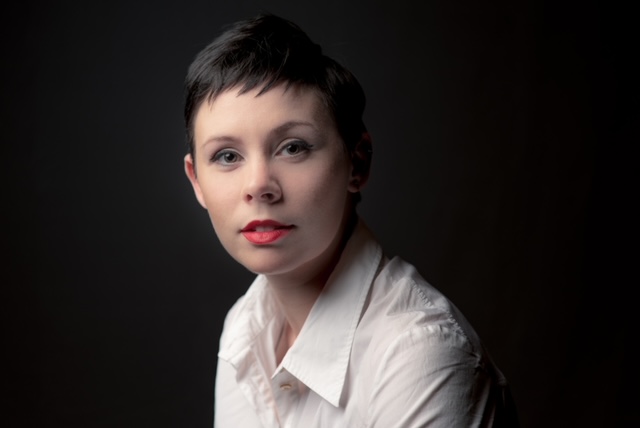HGO Spotlight On: Assistant Conductor Madeline Slettedahl
Madeline Slettedahl has loved music since before she can remember. Her mother was a piano teacher, her father loved to play by ear, and Madeline herself took piano lessons from the time she was a girl growing up in Auburn, Washington. “Music was just part of our household,” she recalls. Later, in high school, she discovered a love for musical theater. “I always loved being a part of putting musicals together,” she shares.
Madeline moved to Houston in 2014 to pursue her master’s degree in collaborative piano and piano performance at the Rice University Shepherd School of Music. It was there that she discovered opera, realizing that it combined classical music and musical theater into one ideal art form. “I found that these two worlds really collided for me, and it was the perfect fit.”
A decade later, she’s Assistant Conductor at HGO, conducting rehearsals, coaching artists, accompanying performances, and completing “other duties as assigned”—i.e., just about anything you could dream up, from serving as therapist, to peacemaker, to cue caller.
Here’s Madeline on her life and career, in her own words:
Grad school is when opera kind of revealed itself to me. During that time, I did a couple of guest contracts with HGO. My first time working here was at a workshop for A House Without a Christmas Tree, as a guest pianist and assistant conductor. I also coached for the Bauer Family High School Voice Studio. Dr. Stephen King, who teaches there, said to me, you know, you could really have a career in this. You should think about it. And I dreamed of working here, but I needed more training.
I decided to apply for summer programs. I went to Music Academy of the West, then trained as a young artist pianist at the Lyric Opera of Chicago. I won a competition there, the Marilyn Horne Song Competition, and it all just kind of snowballed. I was like, well, I might as well give this opera thing a try. After that I decided to audition for HGO. It was strange because it was right before COVID, and the performing arts went on pause. Later, I got an email from Maestro Richard Bado, saying, hope you’re okay, let’s talk about the future.
My individual title is Assistant Conductor, but we’re collectively known as the music staff. One of the many things we do is play the piano for the rehearsals. It would be impractical to hire the entire orchestra for every single rehearsal, so up until about the last week or two, it’s with piano. We use piano vocal scores, which are a reduction of what the orchestra is playing, but they’re really more of a guideline than set in stone. We're expected to cross-reference with the full score and make sure we’re adding what’s missing from the piano vocal score, which is often a lot, or take away things that are not actually there. It requires a lot of flexibility.

During the main season shows, we’re the direct assistants to the conductors, making us the main liaison between them and the singers. If notes need to be given—musical notes, text notes, language notes, anything that has to do with what you’re hearing on the stage—they come directly from us. The singers can’t always trust their auditory experience to be what is heard in the theater. They have to put a certain amount of trust into our assessment of what we’re hearing. And it’s not just them—we’re also assisting the orchestra and the conductor with musical feedback. We provide coaching to make sure everyone’s sounding their best, including a more supportive role for members of the Butler Studio, who we see on a regular basis.
We have this running joke in the music staff. It’s called “other duties as assigned.” Because you might be asked to do just about anything, and you’re like, well, other duties as assigned. This can include things such as backstage conducting and playing keyboard instruments in the pit, including celesta, glockenspiel, piano, harpsichord, and fortepiano; playing backstage sound effects that require musical timing; and pre- and post-show check-ins with the performers. There are some strange ones. Sometimes you just stand backstage and point at somebody when it’s the exact right time for them to sing one little word. You stand there for so long, watching a backstage monitor of the conductor, and then you point at someone when it’s the exact right time to sing the word—J’accuse!—and then that’s it.
I have this thing where each opera I most recently prepared is my favorite. I am a huge Mozart fan, so doing Don Giovanni was great. And before that I probably would have said Falstaff. But to this day, my favorite opera is Dialogues of the Carmelites, which we did in my first season. There’s a big piano part in the “Salve Regina” at the end, and I got to play it. So much of the time when I’m helping put together an opera, once the preparation process is over, the majority of my work is complete. Getting to play in the orchestra for that and being a part of each performance—that was really special.
I like that HGO has a real commitment to highlighting traditional works while fostering new ones. I think that any successful classical arts organization needs to have a continuation and celebration of tradition while also bringing in new voices, new perspectives. HGO is one of the industry leaders that embodies that philosophy. That’s something I can really get behind.
For more of HGO Spotlight On Series read Part 5.